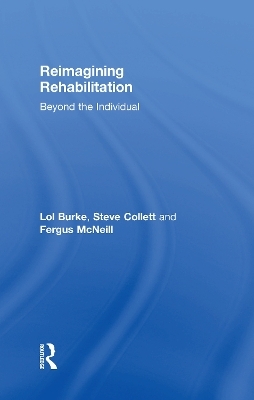
Reimagining Rehabilitation
Routledge (Verlag)
978-1-138-23317-1 (ISBN)
This book aims to make the case for and provide some of the resources necessary to reimagine rehabilitation for twenty-first-century criminal justice. Outlining an approach to rehabilitation which takes into account wider democratic processes, political structures and mechanisms of resource allocation, the authors develop a new model of rehabilitation comprising four forms – personal, legal, social and moral.
Personal rehabilitation concerns how individuals make their journeys away from offending and towards reintegration and how they can be supported to do so, whilst legal rehabilitation concerns the role of the criminal courts in the process of restricting and then restoring the rights and status of citizens. Moral rehabilitation is concerned with the ethical basis of the interactions between the individual who has offended and the people and organisations charged with providing rehabilitative services. Social rehabilitation explores the crucial contribution civil society can make to rehabilitation, exploring this through the lens of citizenship, community and social capital.
Drawing on the conceptual insights offered in the late Stan Cohen’s seminal work – Visions of Social Control – and specifically his insistence that modern social institutions can aspire to doing good and doing justice, the authors argue that these values can underpin a moral pragmatism in designing social interventions that must go beyond achieving simply instrumental ends. Reimaging rehabilitation within the context of social action and social justice, this book is essential reading for students and scholars alike, particularly those engaged with criminal justice policy, probation and offender rehabilitation.
Lol Burke is Professor in Criminal Justice at Liverpool John Moore’s University and specialises in the areas of probation research, policy and practice. He has a particular interest in the way that occupational culture acts out in probation settings and resettlement provision for released prisoners. As a former probation practitioner, he has considerable experience working in both community and custodial settings. Steve Collett worked for three North West probation areas across four decades, retiring from the Cheshire Probation Trust in December 2010 after ten years as its chief officer. He is an Honorary Fellow within the Department of Sociology, Social Policy and Criminology at Liverpool University, an Honorary Reader in Criminology within the School of Law at Manchester University, and an Honorary Fellow of Liverpool John Moores University. Fergus McNeill is Professor of Criminology and Social Work at the University of Glasgow where he works in the Scottish Centre for Crime and Justice Research and in Sociology. Prior to becoming an academic in 1998, Fergus worked for a number of years in residential drug rehabilitation and as a criminal justice social worker.
1. Introduction: What’s wrong with contemporary rehabilitation and why do we want to change it? 2. Reimagining social control and support: Current realities, dystopian futures? 3. Reimagining the rehabilitative journey: Personal rehabilitation, 4. Reimagining the legal and sentencing framework: Judicial rehabilitation, 5. Reimagining practice cultures and values: Moral rehabilitation, 6. Reimagining civil society and community engagement: Social rehabilitation, 7. Conclusion: Beyond the personal - reimagining something better, fairer and more effective?
| Erscheinungsdatum | 28.09.2018 |
|---|---|
| Zusatzinfo | 2 Tables, black and white; 2 Line drawings, black and white; 2 Illustrations, black and white |
| Verlagsort | London |
| Sprache | englisch |
| Maße | 156 x 234 mm |
| Gewicht | 453 g |
| Themenwelt | Recht / Steuern ► Strafrecht ► Kriminologie |
| ISBN-10 | 1-138-23317-X / 113823317X |
| ISBN-13 | 978-1-138-23317-1 / 9781138233171 |
| Zustand | Neuware |
| Haben Sie eine Frage zum Produkt? |
aus dem Bereich


